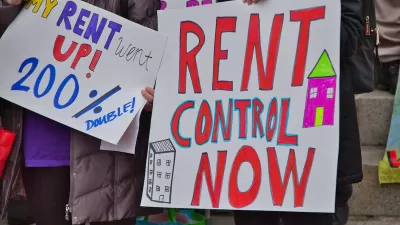The city council failed to move on a proposal that would have implemented rent stabilization, opting instead to explore other avenues for preventing evictions and improving the cost of housing.

The Tampa City Council decided not to pursue rent control measures despite ardent pleas from local housing advocates, reports Justin Garcia. Councilmembers expressed concern about the legal hurdles involved in instituting rent stabilization.
"Councilman Bill Carlson instead proposed an ordinance that would require landlords to give six months notice before increasing rent, which will be discussed at a council meeting on April 21." The council also plans to hold another workshop and distribute $1 million in rent relief on March 1, but the protesters present at last week's council meeting said this doesn't do enough to mitigate the urgent crisis facing Tampa residents, many struggling to pay rising rents on a fixed income.
According to the article, "In order to pass rent control, city council has to declare a housing state of emergency by proving there is an emergency through a study, then put a ballot measure up for vote from the public on whether or not to approve rent control. If the measure were to pass, under current state laws, the city would have to do this every year."
FULL STORY: Despite over 100 people pleading for help at city hall, Tampa City Council shoots down rent control

Planetizen Federal Action Tracker
A weekly monitor of how Trump’s orders and actions are impacting planners and planning in America.

Maui's Vacation Rental Debate Turns Ugly
Verbal attacks, misinformation campaigns and fistfights plague a high-stakes debate to convert thousands of vacation rentals into long-term housing.

Restaurant Patios Were a Pandemic Win — Why Were They so Hard to Keep?
Social distancing requirements and changes in travel patterns prompted cities to pilot new uses for street and sidewalk space. Then it got complicated.

In California Battle of Housing vs. Environment, Housing Just Won
A new state law significantly limits the power of CEQA, an environmental review law that served as a powerful tool for blocking new development.

Boulder Eliminates Parking Minimums Citywide
Officials estimate the cost of building a single underground parking space at up to $100,000.

Orange County, Florida Adopts Largest US “Sprawl Repair” Code
The ‘Orange Code’ seeks to rectify decades of sprawl-inducing, car-oriented development.
Urban Design for Planners 1: Software Tools
This six-course series explores essential urban design concepts using open source software and equips planners with the tools they need to participate fully in the urban design process.
Planning for Universal Design
Learn the tools for implementing Universal Design in planning regulations.
Heyer Gruel & Associates PA
JM Goldson LLC
Custer County Colorado
City of Camden Redevelopment Agency
City of Astoria
Transportation Research & Education Center (TREC) at Portland State University
Jefferson Parish Government
Camden Redevelopment Agency
City of Claremont





























